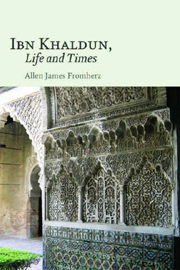4 - EGYPT
Published online by Cambridge University Press: 12 September 2012
Summary
All, except God, is vanity.
Saying of the Prophet MuhammadWhen he entered Cairo for the first time in January 1382, Ibn Khaldun was overwhelmed. As he traveled down the Nile from Alexandria he saw Cairo and the Pyramids emerging on the horizon. He got off the boat and started walking through the streets. The variety and richness of the city was dizzying. He encountered a seemingly endless number of madrasas, colleges, mosques; this was a true metropolis, a city substantially greater in size than Tunis, Fez, or Granada. There may have been above 500,000 inhabitants under the reign of Sultan al-Nasir Muhammad (d. 1340), although the population suffered greatly from the plague and was probably significantly below that number when Ibn Khaldun arrived. Nevertheless, Cairo still outshone every city west of China. He wrote down his first impressions of Cairo:
Capital of the world, garden of the universe, forum for the gathering of peoples … palace of Islam, throne of power, a city embellished with palaces and mansions, ornamented with colleges and schools, its scholars are like shining stars. The city lays across the Nile, river of paradise, receptacle of heavenly water … One could not stop speaking of this city, of its high degree of civilization, of its prosperity.
Ibn Khaldun knew about the splendors of Cairo when he was still living in the Maghrib. He asked the scholar and pilgrim, Al-Maqqari, ‘How is Cairo?’ Al- Maqqari responded to Ibn Khaldun saying, ‘One who has not seen [Cairo] knows not the power of Islam.’ Similarly, he asked a wise man in Bijaya about Cairo who responded, ‘Its inhabitants overflow [the city], as if returning from the last judgment!’ Finally, there was the account of the minister of military affairs in Marinid Fez, Abu al-Qasim al-Barji, who returning from a voyage to Cairo stated, ‘that which humans can imagine surpasses reality, because imagination is more vast than all sensible things. There is, however, one exception: Cairo. This city surpasses all that one could imagine.’ Even the powerful sultan, Abu cInan, attempted ruler of all the Maghrib, was stunned to hear this.
- Type
- Chapter
- Information
- Ibn KhaldunLife and Times, pp. 97 - 113Publisher: Edinburgh University PressPrint publication year: 2010



